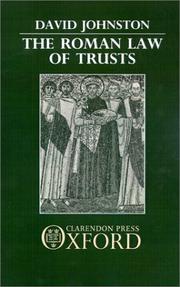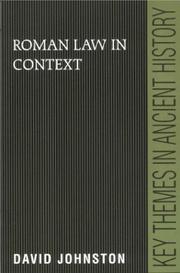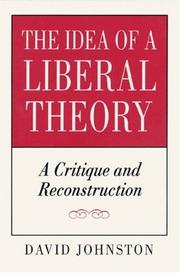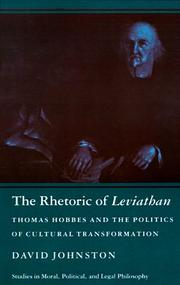| Listing 1 - 10 of 92 | << page >> |
Sort by
|
Book
ISBN: 9781405155762 9781405155779 Year: 2011 Publisher: Chichester Wiley
Abstract | Keywords | Export | Availability | Bookmark
 Loading...
Loading...Choose an application
- Reference Manager
- EndNote
- RefWorks (Direct export to RefWorks)
"A Brief History of Justice traces the development of the idea of justice from the ancient world until the present day, with special attention to the emergence of the modern idea of social justice. An accessible introduction to the history of ideas about justice Shows how complex ideas are anchored in ordinary intuitions about justice Traces the emergence of the idea of social justice Identifies connections as well as differences between distributive and corrective justice Offers accessible, concise introductions to the thought of several leading figures and schools of thought in the history of philosophy "-- "The idea of justice has been central to political philosophy since its origin. Indeed, the two towering book-ends to Western political thought -- Plato's Republic and John Rawls' milestone 1971 publication, A Theory of Justice-- are both essays on justice. Structured around the historical and conceptual relationship between distributive and corrective justice, ABrief History of Justice traces the development of this fundamental idea from antiquity to the present day. This wide-ranging, yet concise book delves deeply into the evolving traditions of justice, from roots in Babylonian and Hebrew law and Greek political thought to the most prominent contemporary renderings in the work of Rawls and other modern thinkers, including incisive chapter-length introductions to the work of Plato, Aristotle, the utilitarians, Kant, and Rawls. David Johnston weaves a sophisticated, yet accessible, narrative, integrating philosophical discussion with pressing contemporary questions about justice. With clarity and scholarly precision, A Brief History of Justice offers readers an invaluable survey of an important and powerful concept that continues to dominate the field of political philosophy"--
Political philosophy. Social philosophy --- Justice (Philosophy) --- Social justice --- Philosophy --- History. --- Philosophy. --- General --- General. --- Equality --- Justice --- History

ISBN: 0198252161 9780198252160 Year: 1988 Publisher: Oxford Clarendon
Abstract | Keywords | Export | Availability | Bookmark
 Loading...
Loading...Choose an application
- Reference Manager
- EndNote
- RefWorks (Direct export to RefWorks)
Roman law --- Trusts and trustees (Roman law) --- Fideicommissum (Roman law) --- Fiducie (Droit romain) --- Fidéicommis (Droit romain) --- History --- Histoire --- -Trusts and trustees (Roman law) --- -Roman law --- History. --- -History --- Fidéicommis (Droit romain) --- Trusts and trustees (Roman law) - History --- Fideicommissum (Roman law) - History

ISBN: 0521639611 9780521639613 0521630460 Year: 1999 Volume: *1 Publisher: Cambridge University press
Abstract | Keywords | Export | Availability | Bookmark
 Loading...
Loading...Choose an application
- Reference Manager
- EndNote
- RefWorks (Direct export to RefWorks)
This book explains the rules of Roman law in the light of the society and economy in which it operated. The main topics discussed are: the family and inheritance; property and the use of land; commercial transactions and the management of businesses; litigation and the assertion of legal rights.
Roman law --- -Justice, Administration of (Roman law) --- -Roman law --- Civil law --- Civil law (Roman law) --- Law --- Law, Roman --- Popular works --- Rome --- Social life and customs. --- Commerce. --- Justice, Administration of (Roman law) --- Popular works. --- Justice [Administration of ] (Roman law) --- Social life and customs --- Commerce --- Justice, Administration of (Roman law) - Popular works. --- Rim --- Roman Empire --- Roman Republic (510-30 B.C.) --- Romi (Empire) --- Byzantine Empire --- Rome (Italy) --- Roman law - Popular works.
Book
ISBN: 9780521895644 9780521719940 0521719941 Year: 2015 Publisher: New York, N.Y. Cambridge University Press
Abstract | Keywords | Export | Availability | Bookmark
 Loading...
Loading...Choose an application
- Reference Manager
- EndNote
- RefWorks (Direct export to RefWorks)
This book reflects the wide range of current scholarship on Roman law. The essays, newly commissioned for this volume, cover the sources of evidence for classical Roman law; the elements of private law, as well as criminal and public law; and the second life of Roman law in Byzantium, in civil and canon law, and in political discourse from AD 1100 to the present. Roman law nowadays is studied in many different ways, which is reflected in the diversity of approaches in the essays. Some focus on how the law evolved in ancient Rome, others on its place in the daily life of the Roman citizen, still others on how Roman legal concepts and doctrines have been deployed through the ages. All of them are responses to one and the same thing: the sheer intellectual vitality of Roman law, which has secured its place as a central element in the intellectual tradition and history of the West.
Roman law. --- Roman law

ISBN: 0691033811 9780691033815 Year: 1994 Publisher: Princeton Princeton university press
Abstract | Keywords | Export | Availability | Bookmark
 Loading...
Loading...Choose an application
- Reference Manager
- EndNote
- RefWorks (Direct export to RefWorks)
Liberalism --- Libéralisme --- --Critique --- --theories economiques --- economie de marche libre --- economische theorieen --- vrije markteconomie --- Liberalism. --- theories economiques --- --Liberalism. --- Liberal egalitarianism --- Liberty --- Political science --- Social sciences --- --Liberalism --- Critique

ISBN: 0691023174 0691077177 069121932X Year: 1989 Publisher: Princeton (N.J.): Princeton university press
Abstract | Keywords | Export | Availability | Bookmark
 Loading...
Loading...Choose an application
- Reference Manager
- EndNote
- RefWorks (Direct export to RefWorks)
The description for this book, The Rhetoric of Leviathan: Thomas Hobbes and the Politics of Cultural Transformation, will be forthcoming.
Hobbes, Thomas, --- PHILOSOPHY / Political. --- Abraham. --- Bacon, Francis. --- Brandt, Frithiof. --- Calvinism. --- Catholic church. --- Christ. --- Copernicus. --- Galileo. --- God. --- Harvey, William. --- Hermetic tradition. --- Joshua. --- Long Parliament. --- Quintilian. --- Renaissance. --- Thucydides. --- absurdity. --- ambition. --- death. --- definitions. --- discovery. --- egoism. --- enlightenment. --- experience. --- faith. --- felicity. --- fiction. --- geometry. --- human nature. --- imagination. --- literacy. --- magic. --- mechanism. --- method. --- myth. --- obligations. --- paganism. --- papacy. --- poetry. --- prophecy. --- rhetorical tradition. --- scholasticism. --- spirits. --- superstition. --- transmission. --- universe. --- Political science. --- Idees politiques. --- Pensee politique et sociale. --- Administration --- Civil government --- Commonwealth, The --- Government --- Political theory --- Political thought --- Politics --- Science, Political --- Social sciences --- State, The
Book
ISBN: 3428062922 9783428062928 Year: 1987 Volume: 10 Publisher: Berlin Duncker und Humblot
Abstract | Keywords | Export | Availability | Bookmark
 Loading...
Loading...Choose an application
- Reference Manager
- EndNote
- RefWorks (Direct export to RefWorks)
Roman law --- Civil law --- Civil law (Roman law) --- Law --- Law, Roman --- Scaevola, Quintus Cervidius --- Scaevola, Cervidius --- Scevola, Cervidio --- Escévola, Q. Cervidio --- Escévola, C. --- History --- Sources --- History&delete& --- Scaevola, Quintus Cervidius. --- Roman law - History - Sources --- Scaevola, Quintus Cervidius - Liber singularis quaestionum publice tractatarum
Book
ISBN: 0191681350 9780191681356 Year: 1988 Publisher: Oxford : Clarendon,
Abstract | Keywords | Export | Availability | Bookmark
 Loading...
Loading...Choose an application
- Reference Manager
- EndNote
- RefWorks (Direct export to RefWorks)
A history of Roman law and how it affected society, focusing on the legal evolution of the "fideicommissum", a device similar to a "trust" in common law. As part of Roman inheritance law, this affected strategies of succession open to testators and reveals ambitions and legislative concerns.
Trusts and trustees (Roman law) --- Fideicommissum (Roman law) --- Law - Non-U.S. --- Law, Politics & Government --- Law - Europe, except U.K. --- History. --- History --- Roman Empire --- Trusts --- Law --- Roman law
Book
ISBN: 128275209X 9786612752094 1400821517 9781400821518 9781282752092 Year: 1996 Publisher: Princeton, NJ : Princeton University Press,
Abstract | Keywords | Export | Availability | Bookmark
 Loading...
Loading...Choose an application
- Reference Manager
- EndNote
- RefWorks (Direct export to RefWorks)
Liberalism, the founding philosophy of many constitutional democracies, has been criticized in recent years from both the left and the right for placing too much faith in individual rights and distributive justice. In this book, David Johnston argues for a reinterpretation of liberal principles he contends will restore liberalism to a position of intellectual leadership from which it can guide political and social reforms. He begins by surveying the three major contemporary schools of liberal political thought--rights-based, perfectionist, and political liberalism--and, by weeding out their weaknesses, sketches a new approach he calls humanist liberalism. The core of Johnston's humanist liberalism is the claim that the purpose of political and social arrangements should be to empower individuals to be effective agents. Drawing on and modifying the theories of John Rawls, Michael Walzer, Ronald Dworkin, Joseph Raz, Amartya Sen, and others, Johnston explains how this purpose can be realized in a world in which human beings hold fundamentally different conceptions of the ends of life. His humanist liberalism responds constructively to feminist, neo-Marxist, and other criticisms while remaining faithful to the core values of the liberal tradition.
Book
ISBN: 1501506269 1501506064 9781501506062 9781501506260 9781501515132 Year: 2018 Publisher: Berlin Boston
Abstract | Keywords | Export | Availability | Bookmark
 Loading...
Loading...Choose an application
- Reference Manager
- EndNote
- RefWorks (Direct export to RefWorks)
Random Number Generators, Principles and Practices has been written for programmers, hardware engineers, and sophisticated hobbyists interested in understanding random numbers generators and gaining the tools necessary to work with random number generators with confidence and knowledge. Using an approach that employs clear diagrams and running code examples rather than excessive mathematics, random number related topics such as entropy estimation, entropy extraction, entropy sources, PRNGs, randomness testing, distribution generation, and many others are exposed and demystified. If you have ever Wondered how to test if data is really random Needed to measure the randomness of data in real time as it is generated Wondered how to get randomness into your programs Wondered whether or not a random number generator is trustworthy Wanted to be able to choose between random number generator solutions Needed to turn uniform random data into a different distribution Needed to ensure the random numbers from your computer will work for your cryptographic application Wanted to combine more than one random number generator to increase reliability or security Wanted to get random numbers in a floating point format Needed to verify that a random number generator meets the requirements of a published standard like SP800-90 or AIS 31 Needed to choose between an LCG, PCG or XorShift algorithm Then this might be the book for you.
| Listing 1 - 10 of 92 | << page >> |
Sort by
|

 Search
Search Feedback
Feedback About UniCat
About UniCat  Help
Help News
News